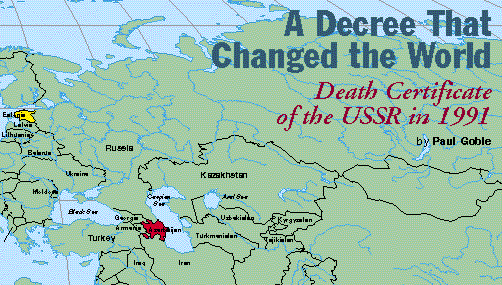|

Autumn 1997 (5.3)
Page 70

Map: Reprinted with permission from Radio
Free Europe / Radio Liberty, broadcast on August 21, 1997.
On August 24, 1991,
Boris Yeltsin, then president of the Russian Soviet Federative
Socialist Republic, issued a decree recognizing the independence
of Estonia, thus ending 50 years of Soviet occupation of that
Baltic country. If the consequences of that decree were momentous
for Estonia, they were, if anything, even greater for the Soviet
Union, for Russia, and for the international community as a whole.
In many respects, Yeltsin's decree was the death certificate
for the Soviet Union, even though that state continued to appear
in the world arena for another four months.
By recognizing the independence of Estonia, Yeltsin set the stage
for his subsequent recognition of the independence of Latvia
and Lithuania, the two other Baltic republics occupied by Stalin
in 1940 as a result of the Molotov-Ribbentrop Pact. But because
Yeltsin was unwilling to acknowledge that the status of the Baltic
countries was fundamentally different from that of the 12 union
republics, the Russian president failed to erect a firewall between
them and, thus, paved the way for their independence as well.
Significance of Estonian
Decision
Yeltsin's decision to issue a decree on Estonian independence
guaranteed that the dissolution of the Soviet Union would be
quick, because it foreshadowed the notion that the borders of
the union republics should become the borders of the post-Soviet
states. It meant that the dissolution process would be peaceful,
precisely because independence would result not from struggle
or long negotiation but rather from unilateral Russian action.
And it created in the minds of Yeltsin and many other Russian
leaders an expectation that the Balts and other non-Russians
would be grateful and thus remain friendly to Moscow. (That hope
was inevitably misplaced, at least in the case of the Baltic
States; but its existence helps explain why Moscow has acted
and continues to act in the way that it does.)
Recognizing Estonia's
Independence
The decree had equally fateful consequences for Yeltsin and Russia.
While many around the world had cheered Yeltsin's heroism during
the failed coup only a few days earlier, few world leaders were
willing to view him as the president of an independent country.
His recognition of Estonian independence changed all that. Many
countries around the world hurried to recognize Estonia-in the
next 10 days alone, more than 40 did so. But in doing so, they
were implicitly recognizing Russia as an independent state as
well. That was not well understood by many diplomats and politicians
at the time, although there was widespread understanding that
such steps constituted some kind of recognition of Yeltsin's
right to act as the predominant leader in Moscow.
Given the attachment many Western leaders felt to then Soviet
leader Mikhail Gorbachev because of the changes he had brought
about both inside the USSR and in Moscow's relations with the
outside world, many world leaders were reluctant to recognize
Estonia. But by acting on the Estonian demand for independence,
Yeltsin effectively forced their hand, thereby gaining just as
much for himself and his country as the Estonians had gained
for theirs.
In the longer term, Yeltsin's action may have had an even greater
impact. By righting an historical wrong, it contributed to the
moral renewal of the Russian people, who also had suffered under
Soviet power. Even more important, it was a significant step
in Russia's retreat from empire, which has given many hope that
the Russia of the future may become a country living at peace
with its neighbors rather than a cause threatening their existence.
Ushering in a Post-Soviet
Period
Yeltsin's decree also helped transform the international system,
posing a set of challenges to world leaders that all of them
are still grappling with. It ushered in a post-Soviet and not
just a post-Cold War world. In addition to pushing aside Gorbachev
and the USSR, it destroyed many of the landmarks of the bipolar
world that had guided the foreign policies of the great powers
since the end of World War II.
Most immediately, Yeltsin's decree helped to recreate what had
been a major security challenge in Europe prior to 1939: coping
with the zone of weak states caught between Moscow and Berlin
and between the Baltic and Black Seas. Indeed, much of the current
debate about the eastward expansion of NATO [North Atlantic Treaty
Organization] and the EU [European Union] and about Russia's
role in this region can be seen as the working out of the consequences
of the August 1991 decree.
Finally, Yeltsin's recognition of Estonia six years ago served
as a reminder that, despite the hopes of some and the fears of
others, history has not ended. Individuals and nations can transform
the world, regardless of the forces arrayed against them.
Paul Goble is Assistant Director of Radio Free Europe/Radio
Liberty.
From
Azerbaijan
International
(5.3) Autumn 1997.
© Azerbaijan International 1997. All rights reserved.
Back to Index
AI 5.3 (Autumn 1997)
AI Home | Magazine
Choice
| Topics
| Store
| Contact
us
|

